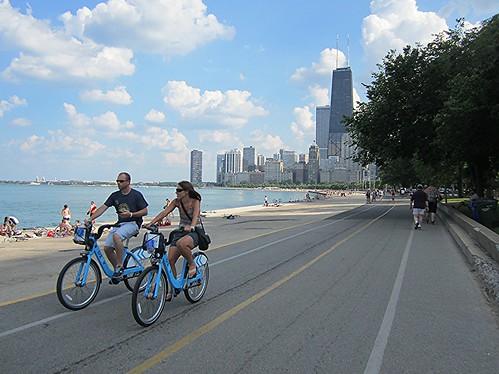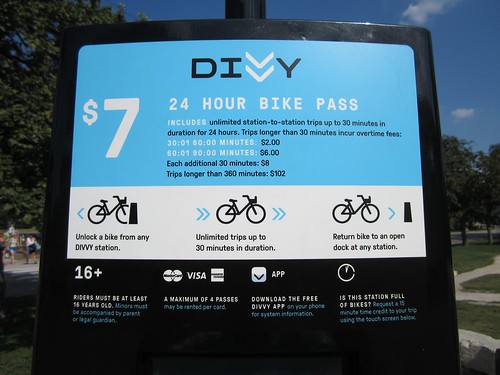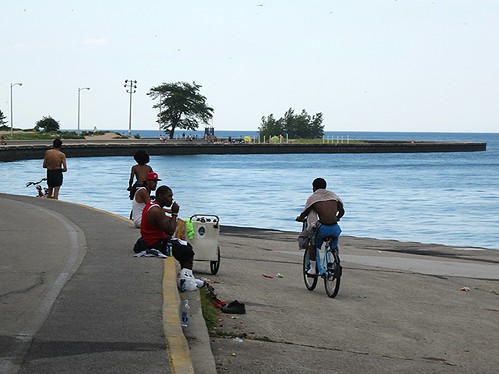I’ve been getting tired of news stories featuring people complaining that Divvy bike-share is a rip-off simply because they don’t understand how it works. However, after talking to a few more customers last week, as well as some discussion on this website, I’m thinking that better communication might be helpful for making the rules and fee structure more obvious to the uninitiated.
Divvy is clearly doing something right. More than 3,130 annual memberships have been sold so far. In the system’s first two weeks of operation, Chicagoans and visitors racked up more than 25,000 bike-share trips and pedaled an estimated 88,000 miles, enough to circle the globe three-and-a-half times, according to the Chicago Department of Transportation. Today the service announced that it hit over 50,000 rides in less than a month.
However, last week DNAinfo Chicago gave airtime to a couple who mistakenly believed that purchasing a $7, 24-hour Divvy pass meant that they could hold onto a bike all day without paying overtime fees. Kristin Manibo rented the bike and then, contrary to the rules of the system, loaned it to her boyfriend, Daniel Torres. While the daily pass allows a user to make an unlimited number of half-hour rides, trips over 30 minutes incur overtime fees. A $2 overtime fee is charged for minutes 31 to 60, $4 is charged for minutes 61 to 90, and it’s $8 for each subsequent half-hour.
After keeping the bike for several hours, the couple racked up hefty overtime charges. "My girlfriend rented the bike thinking it was $7 for the whole day, and little did we know about the hidden costs and fees that put a hole in her account," Torres said. However, the fee structure isn’t hidden at all. It’s clearly posted, in large print, above the touch screen of every docking station, as well as on the station’s large info panel. Manibo simply didn’t bother to read this key information that was literally in front of her nose when she checked out the bike.
“One of the biggest challenges of any new product or service is educating the public around how it works,” Divvy spokesman Elliot Greenberger told DNA. "It's not surprising that some people will be confused but, at the same time, we're upfront that you can take unlimited rides during your 24-hour or annual period." He added that Divvy is relaxing its policies on late charges during this initial launch period.
Streetsblog Chicago’s Steven Vance is also quoted in the DNA piece, commenting that many of the bike-share users seem to be sightseers, rather than locals making A to B trips, something I’ve noticed as well. Steven feels that more marketing is needed to explain that the bikes are intended for 30-minute trips, and he suggested that a decal on the handlebars listing the overtime fees, like the one reminding users of the $1,200 replacement fee, might be helpful.
When I linked to the DNA article in our morning headline stack with the headline, “Couple Ignores Rules Clearly Printed on Divvy Kiosk, Whines About ‘Hidden Fees,’” a few readers wrote to say I was being unfair. One commenter felt Divvy’s 30-minute time limit, intended to keep the bikes circulating, is unreasonable, since many people, especially visitors, would like to take longer rides without being surprised by overtime fees.
I responded that it's foolish to rent a vehicle without paying attention to the clearly posted rules about rental policies. I added that, while the bikes are meant for short transportation trips, not leisurely cruises, it’s possible to keep a bike all day without extra charges by checking it in every half hour, a practice known as “dock surfing.”
If that seems like too much of a hassle, the overtime charges are actually quite reasonable, comparable to rates at Chicago's leading rental companies, Bike and Roll and Bobby's Bike Hike, if you don’t hold onto a bike for more than two hours. After that, as the docking station’s info panel clearly states, “If you want to use a bike for more than a couple of hours, it may be more economical to rent from a bike rental shop.” A list of local bike rental companies is posted on the Divvy website.
As I said, there seems to be a high number of sightseers and others holding onto the bikes for extended periods, judging from the quantity of Divvies on the Lakefront Trail and the common sight of the blue bikes leaning on their kickstands by the water or a volleyball net. Perhaps long-term use is more common in Chicago right now than other bike-share cities since our system is currently focused on the tourist-friendly central city, and the path is a convenient place for a leisurely pedal. However, data on the prevalence of trips that exceed the time limit is not yet available. At any rate, when the system expands to other neighborhoods this summer, more residents will start commuting by Divvy, so it’s likely the fee structure will become common knowledge.
Last Thursday I buttonholed a few different groups of people using the bikes on the lakefront between Oak Street and North Avenue. Most of them turned out to be tourists. Their knowledge of the fee structure varied from a Boston family who are Hubway bike-share members and were therefore completely comfortable with the 30-minute ride concept, to a couple of local teens who said they didn’t know about the time limit.
The boys, who also said they were unaware that minors are supposed to be accompanied by an adult while using Divvy, had parked their bikes on the concrete promenade south of North Avenue and were taking turns swimming. I explained that they were accumulating overtime fees while they were relaxing by the lake. “Thanks for the info,” I said, concluding the interview. “No, thank you for the info,” one of the teens responded. On Sunday morning, when a random potential Divvy customer woke me with an 8 a.m. phone call, asking how the fee structure works, I was convinced that better communication would be helpful to educate people about the rules.
Steven’s suggestion of listing the fees on the handlebars is a good one. Printing them in even larger text on the kiosks might be helpful as well, and perhaps future display ads for Divvy could be worded to make it as obvious as possible that passes and memberships entitle users to an unlimited number of 30-minute trips, not unlimited use of the bikes. If we want to attract a maximum number of riders, Divvy needs to be as user-friendly as possible.
Edited on 12:05 pm on July 23 to reflect the fact that the third half hour of continuous Divvy use costs $4, as explained on the website, although the, admittedly confusing, text above the touch screen and on the info panel could easily be interpreted to mean the third half hour of use costs $6.









